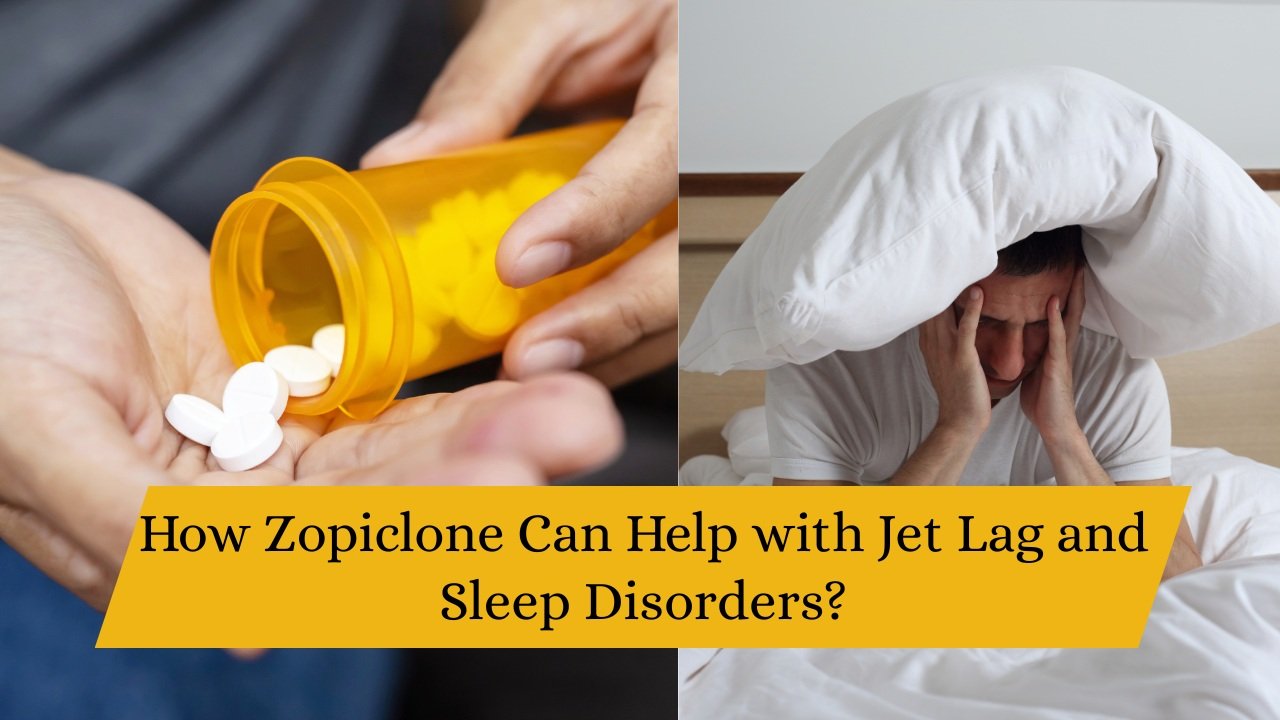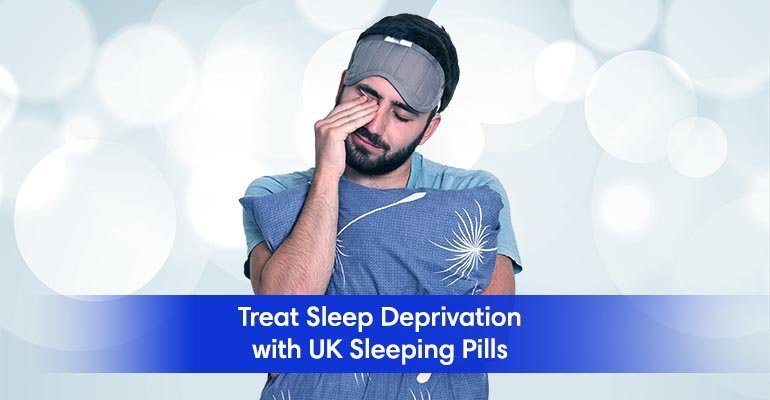Jet lag and sleep disorders can seriously interfere with your day-to-day life, making you tired, cranky, and unable to give your best. Whether you’re a regular traveler who crosses time zones or someone who has insomnia or other sleep disorders, finding a solution is important. One of them is Zopiclone, a drug that has been in the limelight for its ability to treat jet lag and sleep disorders. In this comprehensive guide, we’ll explore how Zopiclone works, its benefits for managing jet lag and sleep issues, and important considerations for its use.
What Is Zopiclone?
Zopiclone is an atypical, non-benzodiazepine hypnotic drug that is widely prescribed for the treatment of transient insomnia and other sleep conditions. It falls under a class of medications known as “Z-drugs” that act on the brain’s neurotransmitter called gamma-aminobutyric acid (GABA), augmenting its effect to induce rest and sleepiness. Unlike the benzodiazepines, Zopiclone has a shorter half-life, which clears the body rapidly, lowering the risk of the following day drowsiness upon proper use.
Zopiclone is usually prescribed for a short duration, sometimes for a few days to a fortnight, to assist individuals in developing a normal sleep pattern. Its sedative properties render it a likely candidate for treating sleep disturbances due to jet lag or other transient disturbances.
Understanding Jet Lag and Its Effect on Sleep
Jet lag is the result of your body’s internal clock, or circadian rhythm, being thrown off the local time when traveling through several time zones. The misalignment causes a variety of symptoms such as:
- trouble falling asleep or maintaining sleep
- daytime drowsiness and sleepiness
- poor concentration and irritability
- digestive disturbances
- general unease or malaise
Jet lag is especially difficult for frequent travelers, business travelers, or those taking long-distance vacations. The severity of jet lag tends to be related to the number of time zones traveled and direction of travel—eastbound travel is more disorienting than westbound.
To patients under jet lag, the failure to sleep at the correct local time can lengthen recovery, and it becomes more difficult to adapt to a new routine. This is where Zopiclone can provide relief in the short term by regulating sleep patterns during adaptation time.
How Zopiclone Helps with Jet Lag
Zopiclone’s main function in treating jet lag is to allow the traveler to sleep and remain asleep at the right time in his or her new time zone. Through its relaxing properties and decreasing the latency to sleep, Zopiclone can help the circadian rhythm recover more rapidly. The process is as follows:
- Encourages Quicker Sleep Onset: Zopiclone quiets the brain’s activity, which allows for sleep even when your body is still getting used to a new time zone.
- Enhances Sleep Quality: By lengthening deep sleep time, Zopiclone decreases nighttime wakefulness, enabling more restorative sleep.
- Eliminates Jet Lag Symptoms: Proper sleep can cure daytime fatigue, irritability, and mental fogginess, allowing travelers to feel more alert and productive.
- Short-Term Use for Adjustment: Zopiclone is usually taken for a couple of nights upon arrival at a new destination, allowing the body time to adjust to the local time. Though Zopiclone can work in jet lag, it’s critical to take it under medical care to prevent dependency or side effects. A medical professional can suggest the right dosage and length based on your travel itinerary and medical history.
Zopiclone for Sleep Disorders Other Than Jet Lag
Aside from alleviating jet lag, Zopiclone is also used extensively to treat other sleep disorders, especially insomnia. Some of the most prevalent sleep disorders where Zopiclone can be helpful are listed below:
- Short-Term Insomnia: Transient or short-term insomnia is triggered by life change, temporary disturbance such as traveling, or stress. Zopiclone can break the vicious cycle of wakefulness by allowing a few nights of steady sleep so the body can get into a proper sleeping pattern again.
- Struggling to Stay Asleep: Others can easily fall asleep but wake up in the middle of the night multiple times. The ability of Zopiclone to increase sleeping time will assist in avoiding disturbances during rest.
- Anxiety-Induced Sleep Difficulty: For individuals whose insomnia is caused by anxiety or racing thoughts when they go to bed, Zopiclone’s soothing qualities can help, enabling them to relax and fall asleep more easily.
- Shift Work Sleep Disorder: Individuals working night shifts or rotating shifts tend to have difficulty sleeping during the day. Zopiclone can be used to control sleep at irregular times.
Though Zopiclone is useful for immediate relief, it’s not a solution for long-term use in the case of chronic sleep disorders. Lifestyle modifications, cognitive behavioral therapy for insomnia (CBT-I), and proper management of underlying medical conditions are generally prescribed for long-term relief.
Advantages of Using Zopiclone for Sleep Disorders
Zopiclone has a number of benefits for those suffering from jet lag or sleep disorders:
- Rapid Onset: Zopiclone acts within 30–60 minutes, making it perfect for people who need immediate relief from sleep.
- Brief Half-Life: Due to a half-life of around 5–6 hours, Zopiclone has less chance of inducing morning drowsiness compared to longer-lasting sleep drugs.
- Good for Temporary Disturbances: From jet lag to a hectic week, Zopiclone can be your savior during brief periods of sleeping difficulties.
- Enhances Daytime Performance: By inducing quality sleep, Zopiclone ensures improved concentration, mood, and productivity throughout the day.
Also Read: How Insomnia Affects Your Daily Life (And What You Can Do About It)
Key Considerations and Precautions
Though Zopiclone can be extremely effective, it’s not for everyone, and there are key considerations to remember:
- Prescription-Only Drug: Zopiclone is a controlled drug in most countries and must be prescribed. Always consult with a medical professional to decide whether it’s right for your situation.
- Short-Term Use Only: To reduce the risk of dependence, Zopiclone is usually prescribed for no longer than 7–14 days. Tolerance can develop with long-term use, making it less effective in the long run.
- Possible Side Effects: Common side effects are a metallic taste in the mouth, dry mouth, drowsiness, or slight dizziness. Rare but serious side effects, including memory problems or abnormal behavior, must be reported to a doctor at once.
- Do Not Take Alcohol and Other Sedatives: Taking Zopiclone with alcohol or other central nervous system depressants will heighten the potential for harmful side effects, such as respiratory depression.
- Not for Everyone: Zopiclone might not be appropriate for patients with specific diseases, including kidney or liver disease, respiratory conditions, or substance abuse histories. Pregnant and breastfeeding women should likewise avoid taking it except on the recommendation of a physician.
- Non-Medication Strategies: For mild sleep problems and jet lag, non-medication treatments such as light exposure, melatonin supplements, or keeping a fixed sleep schedule can work and are to be used in addition to or in place of Zopiclone.
Hints for Proper Use of Zopiclone
To get maximum benefits from Zopiclone with least risks, keep the following points in mind:
- Take It Just Before Sleeping: Zopiclone acts promptly, so take it just before sleeping for at least 7–8 hours.
- Adhere to Dosage Instructions: Do not take more than the recommended dose, as this raises the risk of side effects and addiction.
- Use for Jet Lag Strategically: Take Zopiclone for the initial nights following your arrival at your destination to assist in synchronizing your sleep pattern.
- Use with Healthy Sleep Habits: Establish a sleep-conducive environment by making your bedroom dark, quiet, and cool, and refrain from caffeine or screens prior to sleeping.
- Consult Your Doctor: Talk to a health care professional about your travel schedule or sleeping problems to confirm Zopiclone is appropriate.
Alternatives to Zopiclone for Jet Lag and Sleep Disorders
While Zopiclone is effective, it’s not the only medication used to treat jet lag or sleep disorders. Here are alternative options:
- Melatonin Supplements: Melatonin, which is the sleep-regulating hormone, can realign the circadian rhythm while traveling.
- Cognitive Behavioral Therapy for Insomnia (CBT-I): This medication-free evidence-based therapy treats the underlying causes of insomnia.
- Light Therapy: Exposure to bright light at certain times can reset your internal clock to match a new time zone.
- Lifestyle Changes: Regular exercise, a regular sleep schedule, and stress-reducing activities can enhance sleep naturally.
- Other Drugs: In other instances, physicians will prescribe other sleep medications or treat underlying disorders such as depression or anxiety.
Conclusion
Zopiclone is useful in treating jet lag and transient sleep disorders, providing immediate relief and regaining control of sleep cycles. By facilitating rapid onset of spontaneous sleep and enhancing the quality of sleep, it can relieve tiredness and discomfort of time zone travel. Yet its administration should always be under controlled conditions by a health practitioner to ensure safety and prevent possible harm.
For individuals experiencing jet lag or insomnia, the marriage of Zopiclone and good sleep routines and non-medicinal therapies can result in optimal results. Whether you travel frequently or someone who experiences episodic sleep disturbance, knowing what you have on hand empowers you to take control of healthy sleep and a better overall outcome.
Disclaimer: This content is for information purposes only and is not medical advice. Always consult a doctor before initiating any new medication, including Zopiclone, to discuss its appropriateness for your individual health requirements.
Also Read: How Long Before Bed Should You Take Zopiclone? A Complete Guide





